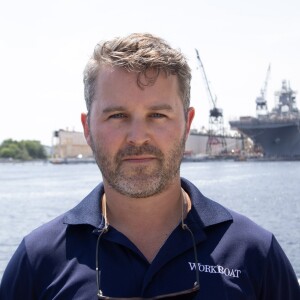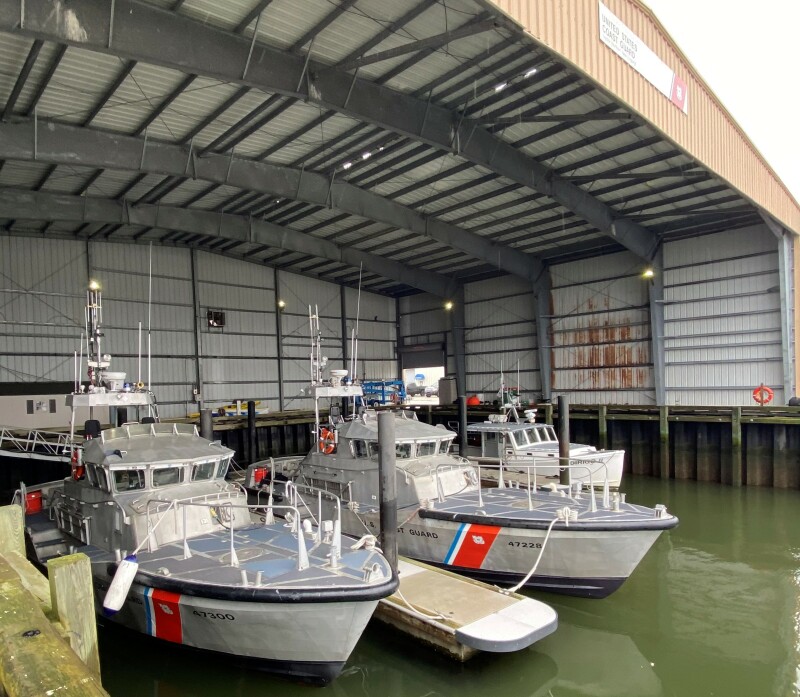The Northern New England Coast Guard held an industry day update this week at its South Portland, Maine, campus.
The Coast Guard covered a wide range of topics including last year’s search and rescue (SAR) numbers, regionally enhanced cybersecurity initiatives, captain license renewals, and life raft demonstrations.
Capt. Amy E. Florentino, commander of the Northern New England sector, kicked things off by discussing trends the Coast Guard is seeing in the North Atlantic. In 2022, there were 261 SAR cases, mostly disabled vessels. These numbers were average compared with pre-pandemic levels, she said. Last year, within the territory, the northern New England sector saved 49 lives and assisted 286. Most pollution responses (59) were a result of sunken vessels, while law enforcement responses totaled 1,810.
Florentino stated there are a multitude of fishing vessels on the Atlantic coast north of Portsmouth, N.H. She expressed optimism about the New England fishing fleet as true stewards of the resource, attributing that success to self-governance. “Our fishermen are doing what they’re supposed to be doing in their fisheries. They’re following the rules, they’re fishing where they’re supposed to fish, and less than 5% of reporting have any kind of fishing violation. That’s really a good thing.”
While that number is encouraging, she also noted that over 25% of the vessels boarded by the Coast Guard have a major safety violation, most commonly life rafts and firefighting equipment.
Chase Leavitt & Co., a life raft servicing company, demonstrated a life raft deployment and spoke about the trends they’ve seen with different models. The company touched on life raft manufacturing companies that try to cut costs, leaving companies like CL&C responsible for making the adjustments.
Life rafts aboard commercial vessels typically are serviced on an annual basis. There is no requirement for non-commercial vessels to service their life rafts, though Chase Leavitt highly recommends doing so.
Numerous components as well as potential defects can affect a life raft’s reliability, which is why regular servcing at an approved facility is required. Among examples Chase Leavitt cited are inflation openings being too small. As CO2 is released into the raft at negative 40-60 degrees Fahrenheit, the opening may freeze, in which case the raft cannot inflate. Pressure-relief valves can cause problems if impropely installed as well. Glue, different fabrics, and manufacturing problems are also reasons to service your life raft on an annual basis.
Notice to mariners: captains renewing their licenses may be experiencing delays in receiving their printed copies. Robert Pump, of the Regional Exam Center in Boston, said this is due to printer issues. There are three printers in West Virginia that print licenses. Currently, two of those printers are down, and the third is on life support. They are doing everything they can to bring all three back to working order, Pump said.
The last segment of presentations involved bolstered cybersecurity measures. Cybersecurity specialist Tom Davis is a civilian employee with the Coast Guard. He spoke of global cyberattacks and what the northern New England sector is doing to prevent similar threats. This July, the agency will conduct a “GPS spoofing” exercise in Belfast, Maine, where Davis will attempt to gain control of Coast Guard vessel GPS.
He also mentioned the difficulty of working with port and vessel companies to prepare them for these cyberattacks. Getting buy-in has proven to be a difficult hurdle when convincing a company to do a site visit. During these exercises, cyber-protection teams operate hunt missions and try to penetrate a company’s system.
Cybersecurity areas of concern for most vessel companies are the crew’s use of personal devices that join an unsecured network, get contaminated, and then jump back onto the vessel’s network.
The industry day visit served as a good reminder that the busy season is right around the corner. As summer approaches, routine equipment checks will be key to ensure that everything is in working order onboard your vessel when the time comes to use it.




